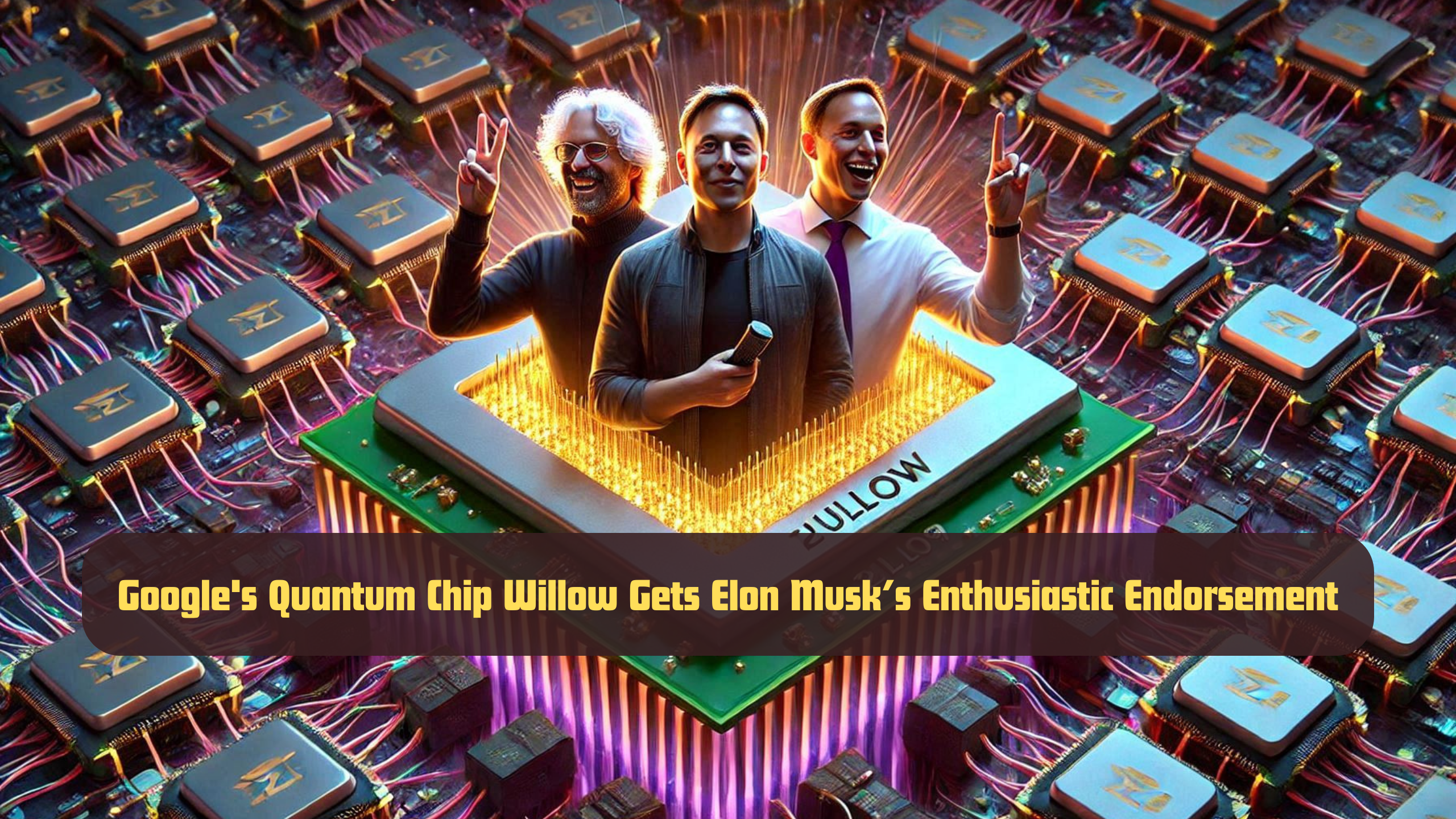Google’s latest breakthrough in quantum computing, the state-of-the-art quantum chip Willow, has ignited conversations across the tech world. This cutting-edge innovation has received widespread acclaim, including an endorsement from Tesla and SpaceX CEO Elon Musk. With a design that revolutionizes quantum error correction, Google’s Quantum Chip Willow sets a new benchmark in computational performance and scalability.

A Big Leap with Google’s Quantum Chip Willow
Google has introduced its revolutionary quantum computing chip, Willow, developed in its Santa Barbara lab. Unveiled on Monday, this breakthrough technology is poised to redefine the future of computation. Quantum computing is a frontier technology that leverages quantum mechanics, a fundamental theory explaining particle behaviors at atomic and subatomic levels. Unlike traditional computers that process data in binary bits (0s and 1s), quantum computers operate with qubits, enabling vastly superior computational capabilities.
What Makes Quantum Chip Willow Exceptional?
Quantum Chip Willow is equipped with 105 qubits and overcomes one of quantum computing’s largest challenges: error correction. As the number of qubits increases, so does the potential for computational errors due to their sensitivity to environmental disturbances. Google’s innovative design links qubits in new configurations, exponentially reducing errors as the system scales.
Hartmut Neven, the head of Google Quantum AI, explains:
“Willow can reduce errors exponentially as we scale up using more qubits.”
This error-correction capability makes Quantum Chip Willow suitable for real-world applications, including drug discovery, artificial intelligence, and climate change modeling.
Also Read: Elon Musk Neuralink: First Human to Receive Neuralink Implant
Breaking Computational Barriers
In a demonstration of its unparalleled power, Quantum Chip Willow solved a computational problem in under five minutes that would take the fastest classical supercomputer an astonishing 10 septillion years. Sundar Pichai, Google’s CEO, highlighted the achievement on social media platform X (formerly Twitter), stating:
“Willow is a state-of-the-art quantum chip.”
This milestone sparked a lively exchange between Pichai and Elon Musk. Musk reacted with a succinct yet telling “Wow” and delved into discussions about the long-term implications of quantum computing.
Quantum Computing: Paving the Path for Future Applications
Quantum computing holds immense promise for addressing humanity’s most complex challenges. Willow’s ability to correct errors in real-time marks a step toward its practical application in fields like:
- Medicine: Accelerating the discovery of drugs and therapies.
- Artificial Intelligence: Enhancing machine learning and predictive models.
- Energy Optimization: Solving problems related to sustainable energy systems and global power grids.
Beyond terrestrial applications, Willow has the potential to extend humanity’s reach into space. During their discussion, Musk and Pichai proposed building quantum clusters in orbit using Musk’s Starship program. Musk also suggested placing solar panels in deserts to expedite renewable energy progress, garnering Pichai’s support.
Also Read: Tesla Apple Watch App Turns Your Watch Into a Car Key
A Decade in the Making
Google’s Quantum Chip Willow’s debut is the result of over ten years of meticulous research and development, culminating in its construction at Google’s advanced manufacturing facility in California. The achievement has been documented in Nature, one of the most prestigious scientific journals.
Wider Implications and Industry Reactions
The launch of Google’s Quantum Chip Willow has triggered a wave of excitement among industry leaders and researchers. Computer scientist and podcaster Lex Fridman described the innovation as “amazing,” reflecting the sentiment of the tech community.
Google’s advances in quantum computing are part of a broader industry competition that includes other tech giants like IBM, Amazon, and Microsoft, along with emerging startups. These companies are racing to unlock quantum computing’s potential, a market predicted to exceed $1 trillion in the coming decade.
Also Read: OpenAI Sora Launch Revolutionizes AI Video Generation Globally
A Glimpse into the Future
With Google’s Quantum Chip Willow, Google has set a new benchmark, but its ambitions extend further. The company envisions a future where quantum clusters in space revolutionize computing and help humanity address critical global challenges.
Neven summed it up aptly:
“We are past the break-even point.”
As quantum computing evolves, the implications for science, technology, and society are boundless. Google’s Quantum Chip Willow’s launch underscores a pivotal moment in the journey toward achieving quantum supremacy.
FAQs
What is Google’s Willow chip?
Willow is Google’s latest quantum computing chip designed to perform complex computations at unprecedented speeds.
How does Willow improve quantum error correction?
Willow uses an innovative qubit linking method that reduces errors exponentially as the number of qubits scales up.
What is the significance of qubits in quantum computing?
Qubits allow quantum computers to process vast amounts of data simultaneously, far surpassing classical computing capabilities.
What problem did Willow solve faster than supercomputers?
Willow completed a computation in under five minutes that would take classical supercomputers 10 septillion years.
Why did Elon Musk praise Willow?
Elon Musk admired Willow’s breakthrough capabilities, emphasizing its potential to advance technology and human civilization.
How does Willow impact fields like medicine and AI?
Willow accelerates drug discovery, enhances AI models, and provides solutions to complex real-world problems.
What are the applications of quantum computing in space exploration?
Quantum clusters in space, powered by chips like Willow, could revolutionize data processing for space missions and cosmic research.
How does Willow compare to other quantum chips?
Willow’s advanced error correction and scalability set it apart from existing quantum chips, making it a game-changer.
Is Willow available for commercial use?
Currently, Willow is a research-focused chip, but its technology will likely pave the way for future commercial quantum computing applications.
What industries will benefit most from quantum computing?
Industries like healthcare, energy, AI, finance, and space exploration stand to gain significantly from advancements in quantum computing.

